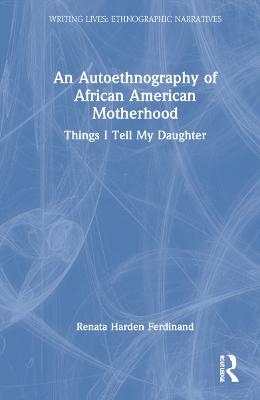
An Autoethnography of African American Motherhood
Things I Tell My Daughter
Seiten
2021
Routledge (Verlag)
978-0-367-42229-5 (ISBN)
Routledge (Verlag)
978-0-367-42229-5 (ISBN)
This is the first full-length explicitly identified autoethnographic text on African American motherhood. It shows the lived experiences of Black motherhood, when mothering is shaped by race, gender and class, and mothers must navigate not only their own, but also their children's positions in society.
This is the first full-length explicitly identified autoethnographic text on African American motherhood. It shows the lived experiences of Black motherhood, when mothering is shaped by race, gender, and class, and mothers must navigate not only their own, but also their children's positions in society.
Ferdinand takes an intimate look at her mothering strategies spanning ten years (from 2007 to 2017), preparing her daughter to traverse a racist and sexist society. It is a multi-generational text that blends the author’s experience with that of her own mother, grandmother, and her daughter, to engage in a larger discussion of African American/Black mother/womanhood. It is grounded within Black Feminist Theory, which centers the experiences of Black women within the domains of intersecting oppressions. It is from a very personal position that Ferdinand provides a glimpse into the minutiae of mothering that reveal the everyday intricacies of Black women as mothers. It highlights specific strategies Black mothers use to combat discrimination and oppression, from teaching their children about the n-word to choosing positive representations of Black identity in movies, books, dolls, daycares, elementary schools, and even extra-curricular activities. It shows the impact that stereotypical manifestations of Black femininity have on Black women’s experience of motherhood, and how this affects Black women and girls' understanding of themselves, especially their skin color, body shape, and hair texture.
As an interdisciplinary text, this book will be reading for academics and students in a broad range of fields, including Education, African American Studies, Communication Studies, Women Studies, Psychology and Health Studies. It is also a handbook of lived experience for Black mothers, grandmothers, and daughters, and for all mothers, grandmothers, and daughters irrespective of color.
This is the first full-length explicitly identified autoethnographic text on African American motherhood. It shows the lived experiences of Black motherhood, when mothering is shaped by race, gender, and class, and mothers must navigate not only their own, but also their children's positions in society.
Ferdinand takes an intimate look at her mothering strategies spanning ten years (from 2007 to 2017), preparing her daughter to traverse a racist and sexist society. It is a multi-generational text that blends the author’s experience with that of her own mother, grandmother, and her daughter, to engage in a larger discussion of African American/Black mother/womanhood. It is grounded within Black Feminist Theory, which centers the experiences of Black women within the domains of intersecting oppressions. It is from a very personal position that Ferdinand provides a glimpse into the minutiae of mothering that reveal the everyday intricacies of Black women as mothers. It highlights specific strategies Black mothers use to combat discrimination and oppression, from teaching their children about the n-word to choosing positive representations of Black identity in movies, books, dolls, daycares, elementary schools, and even extra-curricular activities. It shows the impact that stereotypical manifestations of Black femininity have on Black women’s experience of motherhood, and how this affects Black women and girls' understanding of themselves, especially their skin color, body shape, and hair texture.
As an interdisciplinary text, this book will be reading for academics and students in a broad range of fields, including Education, African American Studies, Communication Studies, Women Studies, Psychology and Health Studies. It is also a handbook of lived experience for Black mothers, grandmothers, and daughters, and for all mothers, grandmothers, and daughters irrespective of color.
Renata Harden Ferdinand is currently Acting Chair of the Department of African American Studies at New York City College of Technology, USA. She is the recipient of the 2018 Ellis-Bochner Autoethnography and Personal Narrative Research Award from The Society for the Study of Symbolic Interaction (SSSI), affiliate of the National Communication Association, for best published essay.
Foreword
Introduction
Black Girl Expectations
Book Learnings
Strikethrough
Who’s Your Mother?
Crazy Aunts
Puberty and Other Struggles
Reflections
| Erscheinungsdatum | 01.12.2021 |
|---|---|
| Reihe/Serie | Writing Lives: Ethnographic Narratives |
| Verlagsort | London |
| Sprache | englisch |
| Maße | 152 x 229 mm |
| Gewicht | 349 g |
| Themenwelt | Sozialwissenschaften ► Ethnologie |
| Sozialwissenschaften ► Soziologie ► Gender Studies | |
| ISBN-10 | 0-367-42229-8 / 0367422298 |
| ISBN-13 | 978-0-367-42229-5 / 9780367422295 |
| Zustand | Neuware |
| Haben Sie eine Frage zum Produkt? |
Mehr entdecken
aus dem Bereich
aus dem Bereich
wie sich das weibliche Gehirn jetzt verändert und Sie diese neue …
Buch | Hardcover (2023)
Mosaik (Verlag)
CHF 36,90
eine kritische Theorie in 99 Fragmenten
Buch | Softcover (2023)
Campus (Verlag)
CHF 55,95


